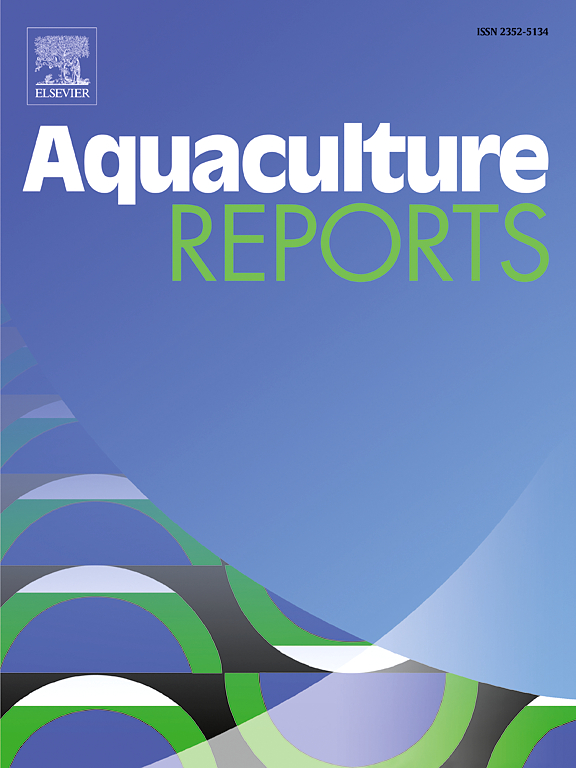Underwater noise impairs reproduction in zebrafish by disrupting the hypothalamic-pituitary-gonadal axis
IF 3.2
2区 农林科学
Q1 FISHERIES
引用次数: 0
Abstract
Anthropogenic underwater noise is a growing threat to fish and has been shown to interfere with social behavior and reproductive outcomes. Yet very few studies have addressed the molecular mechanisms behind it. Here, female and male zebrafish (Danio rerio) were exposed to noise (100–1000 Hz, 130 dB) for 14 days. Reproductive behavior and fecundity were evaluated, and underlying mechanisms were analyzed by examining gonad histopathology, sex hormone, and transcriptional profiles in hypothalamic-pituitary-gonadal (HPG) axis. Males exposed to noise showed a significantly decreased frequency of courtship behavior, including chasing and touching behavior and visits to the spawning area. The spawning capacity was significantly reduced in noise-exposed fish. In males, the concentration of androgen (11-ketotestosterone, 11-KT) was significantly decreased in noise-exposed fish probably by down-regulating expressions of genes in the HPG axis, which contributed to depressed spermatogenesis and courtship behavior. In females, 11-KT was significantly elevated by noise likely due to down-regulated estrogen-converting genes and up-regulated androgen-converting genes, further affecting the gonadal maturation and spawning, which was corroborated in histopathological observation. Overall, noise depressed courtship behavior and disturbed sex hormonal balance and gametogenesis by changing expressions of key genes in the HPG axis, thus inhibiting spawning. This study suggests that noise adversely affects the reproductive outcome by disturbing the endocrine system in fish and could pose a potential threat to fish populations inhabiting noisy waters.
水下噪音通过破坏下丘脑-垂体-性腺轴来损害斑马鱼的繁殖
人为的水下噪音对鱼类的威胁越来越大,并已被证明会干扰社会行为和生殖结果。然而,很少有研究涉及其背后的分子机制。在这里,雌性和雄性斑马鱼(Danio rerio)暴露在噪音(100-1000 Hz, 130 dB)中14天。通过检查性腺组织病理学、性激素和下丘脑-垂体-性腺(HPG)轴的转录谱,评估了生殖行为和繁殖力,并分析了潜在的机制。暴露在噪音环境中的雄性表现出求爱行为的频率显著降低,包括追逐、触摸行为和访问产卵区。受噪音影响的鱼类产卵能力明显下降。在雄性中,噪声暴露的鱼类雄激素(11-酮睾酮,11-KT)浓度显著降低,可能是通过下调HPG轴基因的表达,从而导致精子发生和求爱行为的抑制。雌性11-KT在噪声作用下显著升高,可能与雌性雌激素转换基因下调和雄性激素转换基因上调有关,进而影响性腺成熟和产卵,这在组织病理学观察中得到了证实。综上所述,噪声通过改变HPG轴关键基因的表达来抑制求偶行为,扰乱性激素平衡和配子发生,从而抑制产卵。本研究表明,噪声通过干扰鱼类的内分泌系统对生殖结果产生不利影响,并可能对生活在噪声水域的鱼类种群构成潜在威胁。
本文章由计算机程序翻译,如有差异,请以英文原文为准。
求助全文
约1分钟内获得全文
求助全文
来源期刊

Aquaculture Reports
Agricultural and Biological Sciences-Animal Science and Zoology
CiteScore
5.90
自引率
8.10%
发文量
469
审稿时长
77 days
期刊介绍:
Aquaculture Reports will publish original research papers and reviews documenting outstanding science with a regional context and focus, answering the need for high quality information on novel species, systems and regions in emerging areas of aquaculture research and development, such as integrated multi-trophic aquaculture, urban aquaculture, ornamental, unfed aquaculture, offshore aquaculture and others. Papers having industry research as priority and encompassing product development research or current industry practice are encouraged.
 求助内容:
求助内容: 应助结果提醒方式:
应助结果提醒方式:


